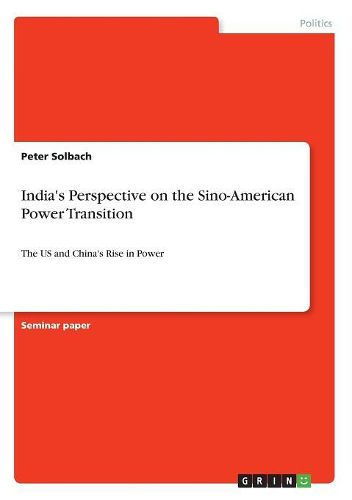Readings Newsletter
Become a Readings Member to make your shopping experience even easier.
Sign in or sign up for free!
You’re not far away from qualifying for FREE standard shipping within Australia
You’ve qualified for FREE standard shipping within Australia
The cart is loading…






Seminar paper from the year 2019 in the subject Politics - Topic: Globalization, Political Economics, grade: 1.0, University of Cologne (Seminar fuer Politische Wissenschaft - Lehrstuhl fuer Internationale Politik und Aussenpolitik), course: Einfuehrung in die Machtuebergangstheorie, language: English, abstract: In this paper, India's stance on the Sino-American power transition will be examined. The questions that arise out of this task and will be answered are: How satisfied is India with the status-quo of the international system and how will China's rise in power change India's overall state satisfaction? In face of America's relative decline, the continuous existence of the established international order, the Pax Americana, throughout the twenty-first century is more and more becoming a question of the rising states' satisfaction with this order. More specifically, it is becoming increasingly clear that India, as the second main driver of the global power shift, will play a significant role in deciding the future of the international system. To answer these questions a quick overview of the global and regional power shift and China's and India's respective state power are given. Afterwards, the theoretical framework for power transitions, the power transition theory, is explained with a focus on the role of state satisfaction and how it can be measured. Public opinion polls and key foreign policy initiatives, as well as alliances, are analyzed to estimate India's state satisfaction with the current system and the influence China's rise in power has on it.
$9.00 standard shipping within Australia
FREE standard shipping within Australia for orders over $100.00
Express & International shipping calculated at checkout
Seminar paper from the year 2019 in the subject Politics - Topic: Globalization, Political Economics, grade: 1.0, University of Cologne (Seminar fuer Politische Wissenschaft - Lehrstuhl fuer Internationale Politik und Aussenpolitik), course: Einfuehrung in die Machtuebergangstheorie, language: English, abstract: In this paper, India's stance on the Sino-American power transition will be examined. The questions that arise out of this task and will be answered are: How satisfied is India with the status-quo of the international system and how will China's rise in power change India's overall state satisfaction? In face of America's relative decline, the continuous existence of the established international order, the Pax Americana, throughout the twenty-first century is more and more becoming a question of the rising states' satisfaction with this order. More specifically, it is becoming increasingly clear that India, as the second main driver of the global power shift, will play a significant role in deciding the future of the international system. To answer these questions a quick overview of the global and regional power shift and China's and India's respective state power are given. Afterwards, the theoretical framework for power transitions, the power transition theory, is explained with a focus on the role of state satisfaction and how it can be measured. Public opinion polls and key foreign policy initiatives, as well as alliances, are analyzed to estimate India's state satisfaction with the current system and the influence China's rise in power has on it.